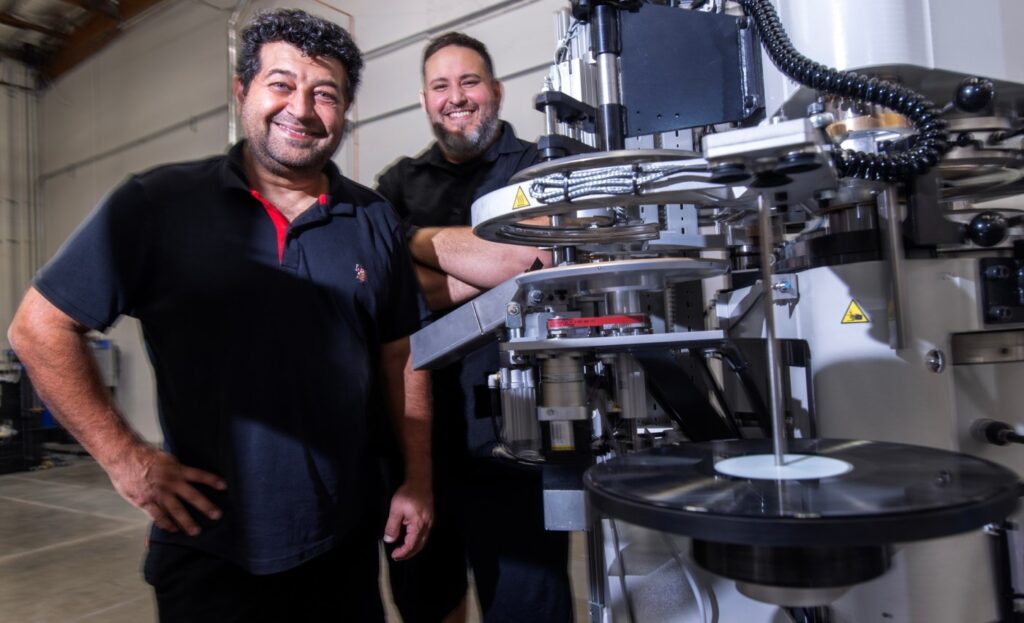
Vinyl might be the one of great comeback stories of the 21st century.
The once-antiquated medium, according to a 2022 sales report from the RIAA, makes up over 70% of physical format sales. But vinyl’s growth has come with a side effect. As demand increased and more major label artists got in on the action, production turnaround times grew. And grew. And grew.
“It created a bottleneck,” says longtime mastering engineer and vinyl manufacturer Gil Tamazyan. “It was locking up most of the pressing plants for a lot of indie artists that were just trying to do small-batch records.”
Enter Onyx Record Press.
Founded by Tamazyan and recording artists Moe Espinosa, Surachai and Cyrusrex, the company was born out of that frustrating situation, recently opening with new, technologically advanced machinery inside a 5200-square-foot building in Arcadia.
“We have a machine that is really new technology where it actually takes the record and puts it in a paper sleeve automatically so you don’t have to get fingerprints on it, like we used to do,” says Tamazyan. “It’s got all these new features on it. Super smart. Super accurate.”
At the time of our August video interview with locals Tamazyan and Espinosa, and Chicago-based Surachai, Onyx had just begun pressing records. It took about two years to launch the endeavor, with a year-and-a-half wait for the equipment, but their story goes back much longer than that.
Tamazyan has been manufacturing vinyl since the turn of the millennium and, over the years, has operated presses in various L.A.-area lofts. Back then, making records took some ingenuity.
“The opportunity of being able to buy brand-new equipment didn’t exist,” he says, adding that there was also no technical support and no way to get new parts when needed. “You needed a part, you go to a machine shop, you start with the raw piece of metal and you machine a part that you need.”
Espinosa, best known amongst fans of techno as DJ and producer Drumcell, first met Tamazyan when he began releasing records some 20 years ago.
“Gil is an incredibly talented engineer who, when I first met him, had picked up an old pressing machine and knew how to break this thing down into parts and repair it himself,” he says.
Even in the waning years of vinyl’s popularity, the format had its supporters. Club DJs heavily relied on vinyl well into the aughts. Indie labels and artists often still released music on records. You could easily argue that if it weren’t for these niche cultures— from punk rock to techno— vinyl would have gone the way of the 8-track.
But it didn’t. In fact, it crept back into popularity during the previous decade, prompting a slew of reissues of classic albums and limited editions of new ones.
Coming into the current decade, the demand for vinyl was adversely affecting those who had never given up on the format as turnaround times lengthened amidst pandemic-related supply chain issues.
These delays can impact label release schedules and marketing plans if vinyl won’t be ready until months after the digital release. Bands, too, must contend with these issues when their physical products are delayed, but their tour isn’t.
“It’s incredibly difficult to stay in business, especially when you’re getting pushed out by major labels that have a lot more money,” says Espinosa.
Espinosa and Surachai, who also run the indie label Black Noise, understood the pressure of trying to release music while turnaround times started stretching from months to more than a year.
“At one point, the wait was 14 months and that’s when I saw white rage,” says Surachai. “It was frustrating. So this was created out of opportunity and frustration.”
And they knew they weren’t the only ones feeling the pressure to get records pressed in a timely fashion. “It’s a common theme in every conversation— ‘I can’t get records,’” says Espinosa. “It’s a consistent struggle across the board with just about everybody who loves this format and this medium.”
Meanwhile, Tamazyan was getting calls from larger labels desperate for help in getting their records pressed. “There was a lot of hair-pulling and frustration,” he says.
The upside of the vinyl boom, though, is that a few new companies emerged to produce new record presses with modern technology. So, Espinosa says, when Tamazyan presented the idea of launching a record plant with 21st-century machinery, it was a chance to fill a void.
“We had a perfect opportunity to set up a pressing plant to service the community that we care about the most,” says Espinosa.
Right now, Onyx is able to offer 8-10 week turnarounds. “Four weeks into the process, the client receives a test pressing. Four weeks additional after that, we’re delivering the full packaged product,” says Tamazyan. “That’s unheard of since three or four years ago.”
Of course, those turnaround times might change as they expand.
“The ultimate goal was to still be able to provide a product fast enough,” says Espinosa, “so that we can maintain this format and be able to keep independent artists in mind to continue to put their music out.”
Related Articles
The Alarm’s Mike Peters was hospitalized this time last year. Now he’s here playing concerts
Insomniac goes bigger and spookier with Escape Halloween in San Bernardino
War will celebrate the 50th anniversary of ‘The World is a Ghetto’ with a limited box set
How ‘Wayne’s World’ director Penelope Spheeris became a true-crime podcaster
Mariah Carey adds a second Christmas show at the Hollywood Bowl
